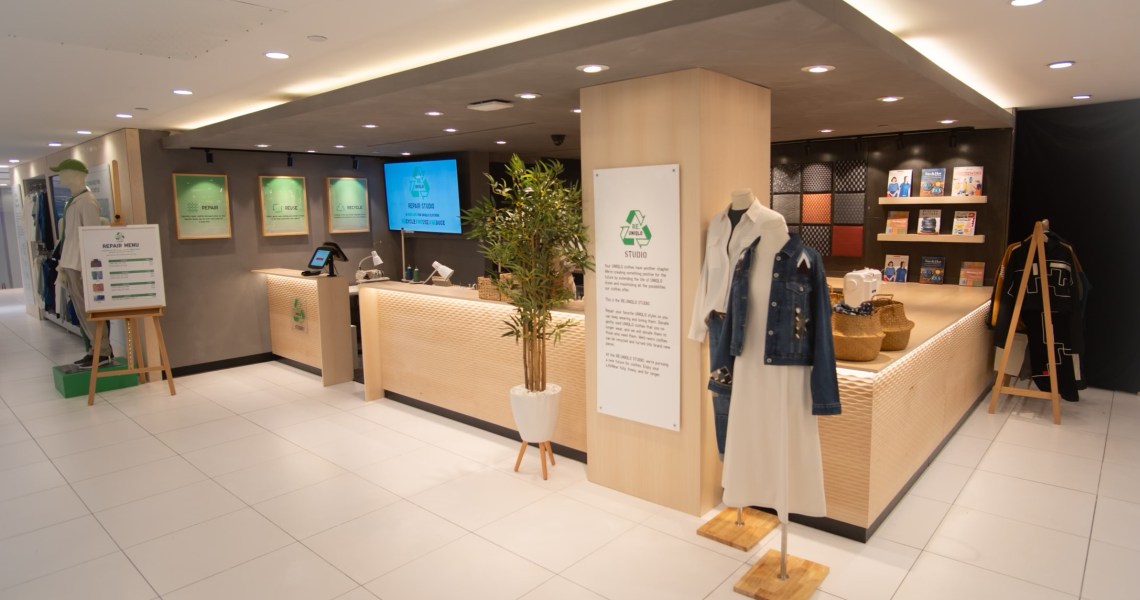Re:Uniqlo Studios, Uniqlo’s repair-focused shop-in-shops, open on Friday 17 in New York on Fifth Avenue, in Beverly Hills, on State Street in Chicago and in Florida’s Disney Springs. In addition, the company reopened an existing location in NYC’s SoHo.
Uniqlo initially launched the repair service at its Berlin store in fall 2021, but under a different name. In February 2022, Uniqlo opened a second location, in SoHo, New York, before opening a Re:Uniqlo Studio five months later in its newly-opened flagship on Regent Street in London. Now, the service is available in nine countries globally, across 12 stores. With this U.S. expansion, that number will increase to 17, highlighting the brand’s prioritization of the repair service.
Beyond the shop-in-shop Studios, the “Re:Uniqlo” umbrella encompasses a takeback program called the All Product Recycling Initiative. Uniqlo has run this program in partnership with United Nations High Commissioner for Refugees for 20 years.
“Re:Uniqlo includes the takeback program; the product side of things, with our product-to-product recycling program of down jackets; and now the Re:Uniqlo Studios,” said Jean-Emmanuel Shein, global director of sustainability at Uniqlo. “There will be other things in the future that will also come under this umbrella.”
Shein said, thus far, the repair studios have been well accepted within their markets and are being used frequently by customers, but he declined to elaborate.
Uniqlo has offered alterations for much longer than Re:Uniqlo has existed, via free in-store services to shorten trousers. “It’s a logical extension to add on additional, added-value services beyond alterations,” Shein said.
Since Uniqlo has the infrastructure, machinery and trained staff in place for repairs, its investment in expanded repair service has been smaller than for a retailer starting from scratch. Shein declined to provide details on the cost, only stating, “The investment [in the expansion] is tied to the [new] visual presentation in stores.”
Shein said the brand is promoting Re:Uniqlo Studios on its social media, as well as through partnerships. Uniqlo is working with Japanese manufacturers Masahiko Morikawa and Studio Masachuka, and designer Sho Konishi. For example, on March 18, the latter will host an event at Uniqlo’s 5th Ave store showcasing Sashiko, a Japanese technique for repairs, as well as upcycled patchwork on vintage kimonos. The first 10 customers will get a one-of-a-kind Sashiko patch, handmade by Studio Masachuka, that they can have stitched onto a Uniqlo product of their choice. At a March 24 5th Ave store event, fashion designer and upcycler Simon Goldman will be offering one-of-a-kind, NYC- inspired Uniqlo patches to the first 25 customers.
Uniqlo is focused on further scaling repairs to provide them to as many customers as possible. “Now, as opposed to this being a behind-the-scenes-only service, the Re:Uniqlo Studios give it a presence on the sales floor, properly branded and with trained employees,” said Shein. “We’ve invested a lot of time and money in the training part, with special teachers. At Fifth Avenue, especially, we’ve also invested in special equipment for repairs.”
The alterations staff will now repair any Uniqlo piece of clothing brought into a store, for a fee. Prices start at $5 for basic repairs and go higher for more customized alterations. The aim is to encourage repair, reuse and recycling among customers, as the company remains dedicated to sustainability.
Uniqlo has often been classified as a fast, disposable clothing brand. “This proves just the opposite,” said Shein. “If we didn’t care about our clothes, we wouldn’t even bother to try and extend their lives in this manner.” He called out that the brand originated the term “lifewear,” which it defines as long-term clothing for everyday living. Repairs and maintenance play into that, he said.
“Uniqlo’s repair service is an example of precisely what the fashion industry needs,” said sustainability consultant Sophie Benson. “The ability to repair or completely reimagine an existing garment is central to the circular economy. As it’s scaling quickly, it would be good to see the brand taking it a step further by using its repair services to offset production in the near future.”
There are several companies that have similar repair programs. California-based Taylor Stitch launched a repair-and-resell platform called Restitch back in 2019. And luxury brands like Hermès and Mulberry have long offered in-house repair services, with the former offering over 700 different repair services and the latter offering lifetime repairs.
Even true fast-fashion brands are starting to offer repairs. Also on March 15, U.K. retailer Primark introduced new durability and repair initiatives, designed to help customers wear Primark items longer.




